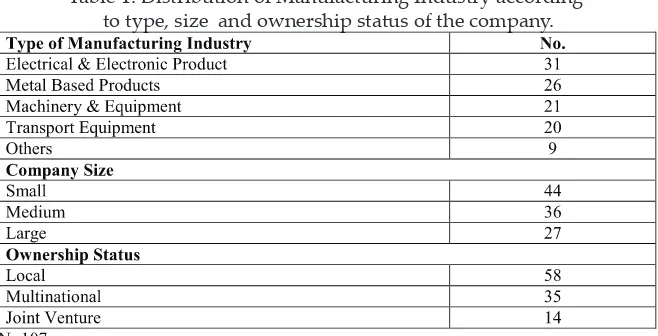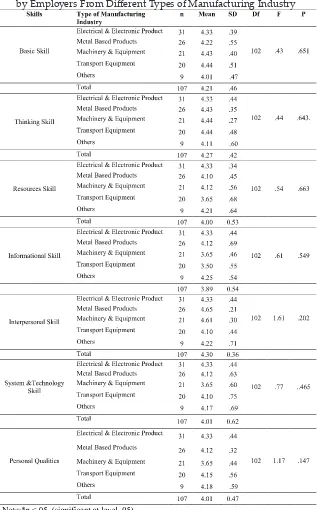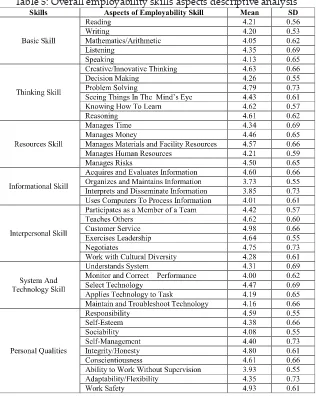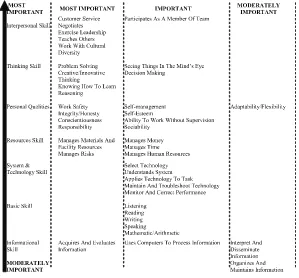IMPORTANCE OF EMPLOYABILITY SKILLS AS PERCEIVED BY EMPLOYERS OF MALAYSIAN MANUFACTURING INDUSTRY
Mohamad Satar Rasul1, A.P. Puvanasvaran2
1Department of Manufacturing Engineering, University Putra Malaysia,
43400 Serdang, Selangor, Malaysia
2Faculty of Manufacturing Engineering, Universiti Teknikal Malaysia
Melaka, Ayer Keroh, 75450 Melaka, Malaysia
E-mails: punesh@utem.edu.my
ABSTRACT
Employability skills are one of the sot skills which are as important as technical skills and should be acquired by an employee in the industrial sector today. Unfortunately not all employees today acquired employability skills that are expected by the employer. This study is carried out to identify aspects of the employability skills and its relationship with the requirement of the employer in the manufacturing industries. Samples for the research consist of 107 employers from manufacturing industry and this study has been done to companies in the manufacturing industry and grouped into three which are type of industry, company size and ownership status. Analysis of the survey, managed to determine important aspects of the employability skills needed by employers in the manufacturing industries. The skills were ranked and results showed that all seven of the employability were considered important by Malaysian manufacturing industry with the basic skill, thinking skill, sources skill, resources skill, system and technology skill and personal qualities were most important skills whereas informational skill was considered moderately important.
Keywords: employability skills, sot skills, technical skills, manufacturing industry
INTRODUCTION
Malaysia is going through an economic transformation and fast entering the industrialization era. This development shows that its industries are progressing very fast and becoming more technologically advanced.
Therefore, Malaysia needs more expert work force to fulill the needs
labor force. This is approximately 6-8 % lower compared to progressing country (Lim, 1994). He also stated that low supply of engineers and technicians gave a big impact on the programmed to industrialize the nation which will cause the low absorption of technological product ability and this will result in the technological indigenization to be slow and the dependency to foreign expatriates for technological support will continue.
According to La Belle (1986), the human capital model views an economic role of education in which individuals pursue the necessary knowledge and skills in order to manage the various aspects of economy and to facilitate its growth through the use of modern technology. In both industrial and developing countries, higher levels of education increase the chances that an individual will be employed.
Meanwhile speciic statement on graduate employability according
to ‘The Ministry of Higher Education of Malaysia’ (MOHE), that is
to produce competent graduates to fulill national and international manpower needs of the graduates employed in their relevant ields
within six months of their graduation. This is the fourth objective of MOHE. Meanwhile results from 2008 tracer study done by MOHE,
out of 13,002 irst degree technical graduates, 35.5% (4,616) were
unemployed. Meanwhile out of 5,515 diploma technical graduates, 25.9% (1,428) were unemployed (MOHE, 2009).
EMPLOYABILITY SKILLS – IS IT AN ISSUE?
Employability skill is a non-technical ability and is part of the work skills which is as important as technical skill and should be acquired
by everybody in the industrial ield. Industrial employer agrees that
employability skill is important to be acquired by their employees to
be outstanding in their ield (Soo and Juma’ayah, 2001). This statement
is supported by Ramlee (2002) who found that through his research, technical graduates in Malaysia has mastered their technical skill
but employers feel dissatisied of their employees because they lack
motivational skills, communication skills, interpersonal skills, critical thinking, problem solving and entrepreneurship skill. These are part of the employability skills.
Syed Hussain (2005) in his study found that technical graduates cannot
fulill the needs and requirements of employer because the technical
training, experience and qualiication. He also found that the number
of technical graduates increased rapidly; there were 20,821 technical graduates in 2001, and 41,282 technical graduates in 2003. And the numbers kept on increasing, up until 2005, there was an increase of 58.2% and totaling 65,304 technical graduates. From this total about 62.3% are still unemployed that is about 40,684 graduates. His study also indicated the reasons for this phenomenon are due to two factors: lack of the skills and experience needed and required by the industries
and secondly lack of practical training and qualiication suicient
to prepare the students with the demand and requirement of the employers.
Mohamed and Mohd (2005) in their research found that graduates perception on the relevance of the content of their course with employability skills is low which they feel the content of the course did not inculcate enough employability skills for them.
According to Shere and Eadie stated in Kathleen (2005);
“Employability skills are not job speciic, but are skills which cut horizontally across all industries and vertically across all jobs from entry level to chief executive oicer”.
This statement shows the importance of acquiring employability skills amongst employees in the industrial sector. According to Kathleen (2005) through her research on technical graduates in United States
also indicated that employer was not satisied with the application
of technical graduates not because of their lack of technical skill or knowledge but due to the lack of non-technical abilities.
METHODOLOGY
Employer chosen as the research sample was categorized into three that is according to type, size and ownership status of the company. Number of company categorized into types, size and ownership status of manufacturing industry is shown in Table 1. The categories were chosen because they are the main trait of manufacturing industry. The objective of choosing these categories are to investigate to what extend
does the employability aspects identiied are important to employers
in the manufacturing industry according to these categories. 107 employers were given a set of questionnaires on employability skills. These employers were segregated accordingly to the three categories, and the results were discussed according to these categories.
The employers chosen as research sample were grouped into ive
[image:4.468.62.391.376.544.2]type of manufacturing industry which were electrical and electronic product (E & E), metal based products (MB), machinery and equipment (ME), transport equipment (TE) and other kinds of product industry (OT). The type of company is based on the MIDA’s categorization of manufacturing industry in Malaysia (MIDA, 2008). Companies participating in this research were grouped into three which is small, medium and large company. The size of the company is based on the number of workers in the company. Companies were again grouped into three according to company’s ownership status whether they are local, multinational or Joint Venture Company.
RESULTS AND DISCUSSION
This section will discuss on the indings of the importance of employability skills by employers from ive diferent types of
manufacturing industry (electrical and electronic, metal based, machinery and equipment, transportation equipment and other type
of company), employers from three diferent groups of company size (small, medium and large) and also employers from three diferent
ownership status of company (local, multinational and Joint Venture).
a) Importance of Employability Skills as Perceived by Employers
from Diferent Types of Manufacturing Industry
Analysis of the responses of employers in ive types of manufacturing
industry on the importance of seven employability skills was shown
in Table 2. The results showed that employers in all ive categories
of manufacturing industry are in consensus on the importance for all seven of the employability skills. The mean score for each employer in
the ive types of manufacturing industry showed litle diference, and
Table 2: Importance of Employability Skills as Perceived
b) Importance of Employability Skills as Perceived by Employers
from Diferent Groups of Company Size
The results showed that there are no signiicant diferences of the
importance of the thinking skills, resource skills, system and technology skills (Refer to Table 3). Whereas, the mean score for basic skills
showed a signiicant diference of opinion by employers. However, according to Cohen efect size (Sherri, 2003 and Wikipedia, 2009), the signiicant diference of opinion can be further tested for its efect size (eta squared, ή2) to accept or ignore the diferences. If the efect size (ή2) is below than 0.2, then the signiicant diference of opinion can be ignored. The value of eta squared, ή2,, for basic skills, showed that the efect size is too small (ή2=0.09). It is the same with the informational skills, the mean score is [F(107)=2.60, p<0.05] but eta squared value is ή2=0.09. The mean score for interpersonal skill showed a signiicant diference [F(107)=4.34, p<0.05], but can be ignored because eta squared value is ή2=0.14. The mean score for personal qualities, [F(107)=3.55, p<0.05] showed signiicant diference but the eta squared value is small, ή2=0.12.
Based on the Cohen efect size (Sherri, 2003; Wikipedia, 2009), the value
showed that only 9% of basic skill, 9 % of informational skill, 14 % of
interpersonal skill and 12 % of personal qualities indicated a diference
of opinion of these employers according to company size. These
showed that employers in diferent sizes of company are in consensus
on employability skills aspect that is important to them.
Amongst these three types of company sizes, it is found that large size company emphasized the importance of acquisition of employability skills among their workers compared to smaller size company. The
speciic employability skills which were considered very important for
all employers regardless of their size were thinking skill, interpersonal skill and personal qualities. These skills were considered most important to be acquired by employees before they come to work.
Table 3: Importance of Employability Skills as Perceived by
Employers from Diferent Groups of Company Size
c) Importance of Employability Skills as Perceived by Employers
from Company with Diferent Ownership Status
Data analysis in Table 4 showed that there is signiicant diference of opinion (p<0.5) between employers grouped in ownership status for
thinking skill, resource skill, informational skill, interpersonal skill, system and technology skill and personal quality skill.
Mean score for system and technology skill , [F(107)=9.42, p<0.05] and eta squared value ή2=0.15 showed there is a small size efect.
The efect size value, showed that only 9% of basic skill, 9 % of resource
skill, 11 % of informational skill and 6 % of interpersonal skill, 15%
system and technology and 9% quality personal showed a diference
of opinion from these employers according to ownership status. The
efect is considered very small and the diference of opinion can be
[image:9.468.76.411.196.480.2]ignored.
Table 4: Importance of Employability Skills as Perceived by
Employers from Company with Diferent Ownership Status
d) Cumulative Result Analysis on the Importance of Employability Skills as Perceived by Employers of Manufacturing Industry
The cumulative result among employers in Malaysian manufacturing industry showed that customer service, work safety and integrity and honesty were most important among the employability skill. Mean while, skills that are considered moderately important were organizing and maintain information, interpreting and disseminating information
[image:10.468.69.385.202.598.2]and adaptability or lexibility (refer Table 5).
Among the seven employability skills, all the manufacturing employers agreed that interpersonal and thinking skills were most important. For basic skills, resource skills, system and technology skills and personal quality skills were considered important and informational skills are moderately important (refer Table 6).
Table 6: Mean score for overall employability skills.
[image:11.468.96.395.326.604.2]Figure 1 showed the ranking order of importance of the employability skills aspects from the manufacturing employer’s perceptions.
CONCLUSION
Lack of employability skills is one of the problems which employers are facing with graduates or their future employees. Various researches on employability skills have been conducted nationally and internationally and it was found that many technical graduates nowadays are lacking in employability skills rather than technical skills.
The results of these indings can be useful as a guide for technical
instructors or lecturer to plan which employability skill should be emphasis, and considered important to be acquired by students before
working in the manufacturing industry. The indings also can be
useful to graduates or job seekers in the manufacturing industry to be prepared the expectation of these employers.
REFERENCES
Amin, K. (1992 November 7). Negara Perlu 300,000 Buruh Mahir. Berita Harian, Malysia, p2.
Wikipedia, (2009). Efect Size. htp://en.wikipedia.org/wiki/Efect_size. 2009.
Kathleen, C.(2005). Developing Employability Skills. Regional Educational Laboratory. School Improvement Research Series (SIRS).
La Belle, T. (1986). Non formal education in Latin America and the Carribean. New York: Preager.
Lim,C.P. (1994). Industrial Development: A Introduction to the Malaysian Industrial Master Plan. Kuala Lumpur, Malaysia: Pelanduk Publications.
MIDA (Malaysian Industrial Development Authority). (2008). Malaysia Performance of the Manufacturing and Services Sectors. Kuala Lumpur, Malaysia: Malaysian Industrial Development Authority.
Mohamed Rashid dan Mohd Rashahidi. (2005). The Year 2004 Polytechnic Convocation Survey. Proceedings of National Seminar “The development of Technology and Technical-Vocational Education
And Training in an Era of Globalization: Trend and Issues”. Kuala
Lumpur.
Secretary’s Commission on Achieving Necessary Skill (1991). Skills and Task for Jobs. A SCANS Report for America 2000. Washington, D.C. U.S. Department of Labour.
Sherri, L.J. (2003). Research Methods and Statistics: A Critical Thinking
Approach. Analyzing the Multiple-Group Experiment (pp. 196-207).
Belmont, USA: Vicki Knight.
Soo Wee Leng, dan Juma’ayah Salleh. (2001). Hubungan Industri dan Pendidikan Vokasional: Isu dan Strategi. Seminar Kebangsaan Pendidikan Teknik dan Vokasional. Universiti Putra Malaysia, Serdang, Selangor.
Syed Hussain.(2005). Meeting The Needs of Employers. Proceedings of National Seminar “The development of Technology and
Technical-Vocational Education and Training in an Era of Globalization: Trend and Issues”. Kuala Lumpur.
The Ministry of Higher Education of Malaysia. (2009). Seminar on
Employability: An Overview of Graduate Employability of Recent Graduates: Some Facts and Figures. Putrajaya, Malaysia.
Yahya (2004). Intergrasi Kemahiran “Employability” Dalam Program





